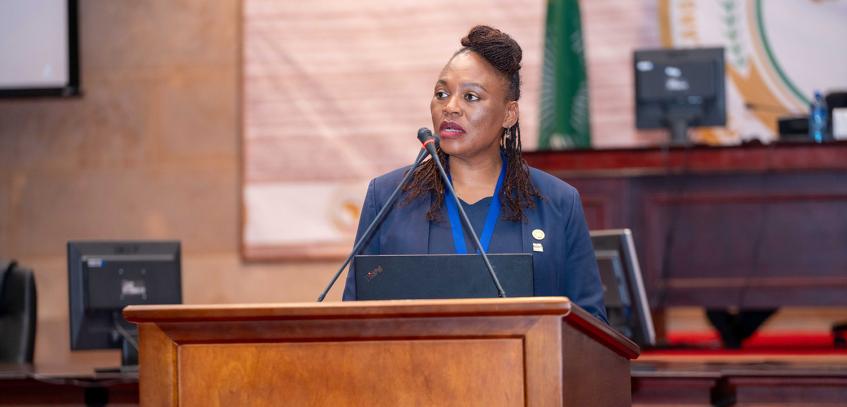
By Baboloki Semele
The African Union Commission (AUC) has called on the Pan-African Parliament (PAP) to take a more active role in advancing Agenda 2063, the continent’s long-term development framework. In a presentation during the opening ceremony of the Sitting of the Permanent Committees and Other Organs of the Pan-African Parliament, the AUC’s Director for Strategic Planning and Development, Ms. Botho Kebabonye Bayendi, emphasized the critical importance of PAP’s involvement in realizing the goals set out in Agenda 2063.
Agenda 2063, adopted in 2013 during the 50th anniversary of the African Union (AU), envisions the socio-economic transformation of Africa over the next 50 years. Built on the ideals of Pan-Africanism and the African Renaissance, the framework aims to position the continent for collective prosperity and development by 2063.
Ms. Kebabonye Bayendi highlighted that PAP’s role is pivotal in the successful implementation of Agenda 2063. She urged the Parliament to advocate for the adoption of the Agenda 2063 Framework by national legislatures and to lead efforts to educate African citizens about their responsibilities under the agenda. She also stressed that PAP should encourage political parties across the continent to align their programs with the objectives of Agenda 2063 and push for its integration into regional, national, and local development plans.
“Our aim is not merely for individual nations to excel in isolation, but for the continent as a whole to advance together,” Ms. Kebabonye Bayendi said, emphasizing the need for PAP to anchor Agenda 2063’s Short-Term Implementation Plan (STYIP) within its five-year strategic plan and work to domesticate it in national parliaments across Africa.
The STYIP lays the foundation for achieving seven key “Moonshots”—strategic milestones that will drive Africa’s transformation. While the Moonshots are set at the continental level, their success depends on coordinated efforts at the regional, national, and local levels.
The Pan-African Parliament’s committees have been aligned with the Moonshots to support their implementation:
- Committee on Rural Economy, Agriculture, Natural Resources, and Environment is tasked with addressing Moonshot 1, which aims for every AU member state to attain at least middle-income status, and Moonshot 6, focusing on empowering African citizens to be more productive.
- Committee on Monetary and Financial Affairs is aligned with Moonshot 1 (middle-income status) and Moonshot 3, which seeks to make public institutions more responsive.
- Committee on Trade, Customs, and Immigration Matters is crucial to advancing Moonshot 2, which calls for a more integrated and connected Africa.
- Committee on Cooperation, International Relations, and Conflict Resolution will focus on Moonshot 4, fostering peaceful conflict resolution, and Moonshot 7, establishing Africa as a strong global player.
Other PAP committees, including those focused on education, gender, health, and justice, are similarly aligned with specific Moonshots, reinforcing the need for comprehensive and collaborative efforts across all sectors of society.
Ms. Kebabonye Bayendi’s appeal aligns with previous calls by PAP leaders for adequate resources and support to fulfill their role in implementing Agenda 2063. She reiterated that the success of the agenda depends not only on government actions but also on the full involvement of institutions, citizens, and communities across Africa.
As Africa embarks on this journey of transformation, PAP’s role in advocating, educating, and aligning political and social efforts with Agenda 2063 will be essential to ensuring that the continent achieves its vision of unity, prosperity, and global influence by 2063.